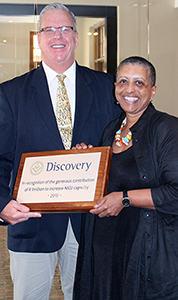Latest News Archive
Please select Category, Year, and then Month to display items
09 December 2020
|
Story Carli Kleynhans
|
Photo Supplied
 Carli Kleynhans.
Carli Kleynhans.
With the most gruelling year recorded in our entire lives, gradually coming to an end we remain hopeful and thankful that we have made it through. From the unexpected shock of going into lockdown, to the worry of having to use a blended approach to succeed in your academics and now finally settling into a new normal, we at the advising office bestow upon you the title of Kovsie champion…because that's exactly what you are!
One of our many champions, Carli Kleynhans, a 3rd (final) year student enrolled for BA Psychology and English shares how she survived…no, actually how she has thrived in 2020.
• What was your biggest concern about your academics when you found out the country was going into lockdown?
My biggest concern about my academics as a final year student was whether the online learning and tests would provide the same in depth learning experiences that are necessary to build upon for future studies.
• What are some of the challenges you've experienced along the way?
Staying focused and trying not to procrastinate was a big challenge I had to conquer, especially trying to not be distracted by my family and my phone. How I survived and was able to thrive in 2020!
• What are some of the strategies you've used to ensure your academics don’t suffer?
Time management was one of the most important strategies that I applied. For most of my classes, I was able to focus each week on a different module, by working and studying in advance I was able to keep up with my workload and still have the weekends to focus on myself, therefore creating designated time to work, study and also time to relax and read.
• What support have you received from the institution that's helped you thus far?
Most of my lecturers have provided needed support regarding our academics. The institution helped provide clarity with everything that was going on.
• What do you think the UFS could have done differently to support student success?
I think the UFS could have provided more resources for the final year students, especially considering we have to apply for further studies; online it was difficult to discern exactly what was necessary for the applications, whereas in class I feel more information would have been provided.
• What has kept you motivated?
Knowing it is my final year has helped to motivate me, as I have to use these grades to apply for further studies. I recently received recognition from Golden Key and this helped to further inspire me to work even harder at my academics.
• What advice do you have for your fellow Kovsies who are finding it difficult to keep going?
Remember to make time for yourself, to look after yourself and your mental health, especially in these difficult times. Work in advance and keep to your personal academic calendar.
Neonatal Care Unit receives donation to expand capacity
2015-10-28
 With the best care and technology available,
the survival rate of premature
babies is about 85%. The neonatal intensive
care unit at the Universitas hospital can now
expand its capacity thanks to a donation of
R1 million by the Discovery fund.
From the left is Prof André Venter.
Head: Department of Paediatrics and
Child Health at the UFS, and mrs Ruth Lewin,
Head: Corporate Sustainability at Discovery.
|
The smallest people need the greatest care. This care is being provided by the neonatal unit in the Children’s Wing of the Universitas Hospital. This project of the University of the Free State (UFS), under the leadership of Prof Andre Venter, has led to several miracles regarding child health since its inception.
Now, thanks to a donation of R1 million rand from the Discovery fund, this unit can expand its capacity and treat more premature babies.
About 14% of babies in South Africa are born before the 37th week of pregnancy. These babies are born with a very low birth weight, and are in need of critical care. The neonatal intensive-care unit at Universitas Hospital is currently equipped to take care of about 14 premature babies at a time, from birth to discharge. However, because of the high incidence of premature births in the hospital’s service area, the unit needs about 45 beds.
The aim of the Children’s Wing Project is to expand the neonatal intensive-care unit in order to meet the demands of the hospital’s service area, which reaches as far as the Southern Cape. The Discovery Fund recently donated R1 million to the project, which will be used to expand the capacity of the neonatal intensive-care unit.
“With the best care and technology available, the survival rate of premature babies is about 85%. Without this, half of all premature babies would die,” says Prof Venter, Head: Department of Paediatrics and Child Health at the UFS.
“This is the reason why private and public partnerships, such as the one with Discovery, are essential to make specialised services available to the most vulnerable people. Discovery has made a significant contribution to the project without which we would not have been able to expand the capacity of the unit